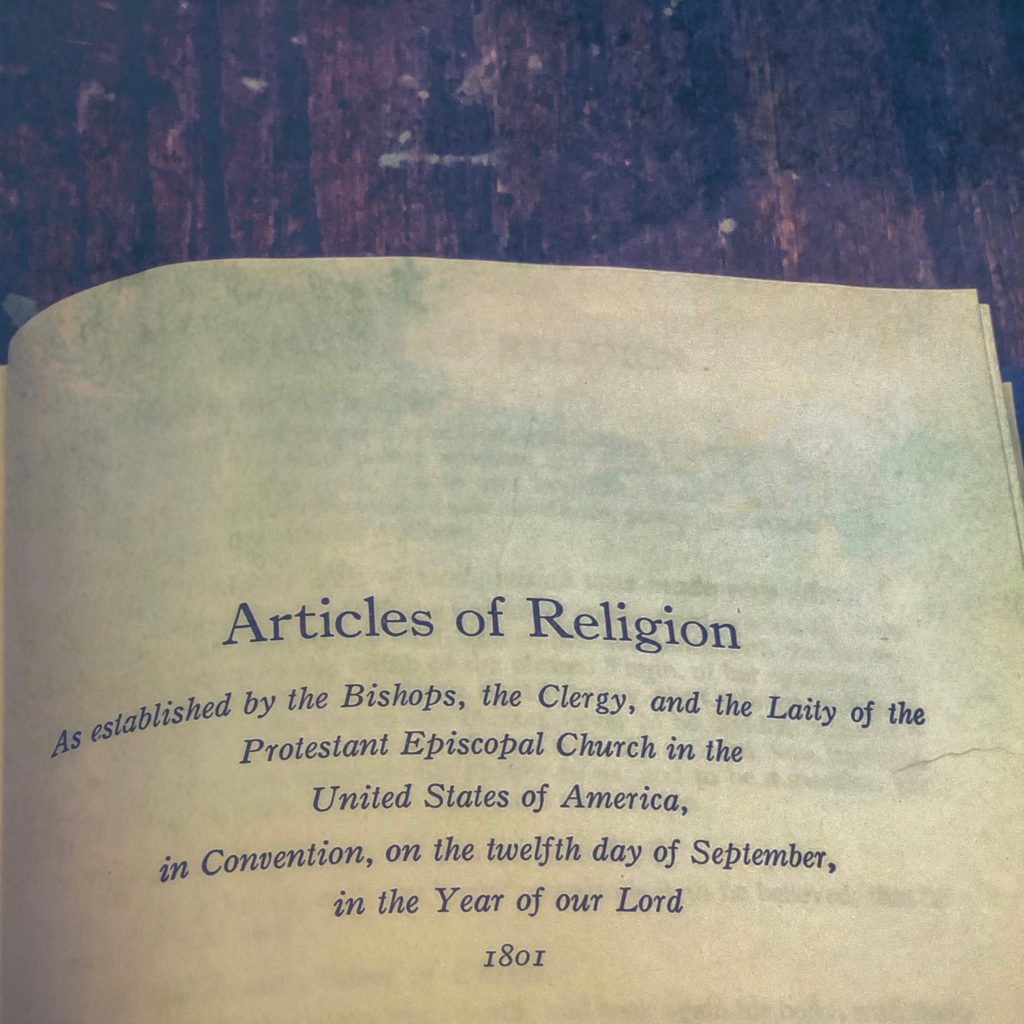
Although good works, which are the fruits of faith and follow on after justification, can never atone for our sins or pass the strict justice of God’s judgement, they are nevertheless pleasing and acceptable to God in Christ and necessarily spring from a true and living faith. Thus a living faith is as plainly known by its good works as a tree is known by its fruit.
by Mark Gladman
Survey people on what the ultimate topic of theological battle during the Protestant Reformation was and you can guarantee that “faith versus works” is going to come out pretty close to the top of the results. Luther’s sola fide (“by faith alone”) often used out of his intended context, along with the persistent rumours that he wanted the Epistle of James removed from the New Testament canon because James’ whole “faith without works is dead” passage in the second chapter contended with his theology of justification by faith alone (only sort-of true) have provided a muddy backdrop to what is still today, for many Christians, a confusing issue.
Article XII however is beautifully and powerfully expressed in such a way as to bring about a helpful balance of how faith and works are not so much an “either/or” consideration, but instead a “both/and.” Follow carefully the movement of the wording in Article XII and you discover a carefully considered argument to embrace both faith and good works as important elements of a holistically lived Christian life.
Works are the “fruits of faith”
“No good tree bears bad fruit, nor again does a bad tree bear good fruit; for each tree is known by its own fruit. Figs are not gathered from thorns, nor are grapes picked from a bramble bush.”
Jesus, (Luke 6:43-44)
Article XII begins by defining what works are. Put simply they are fruit that are a natural result of the tree doing what the tree does. While in the passage above Jesus is referring to how to identify false prophets, the same applies across the board. In his letter to the Galatians, Paul even spelled out what the fruit of the presence of God’s Spirit looks like: love, joy, peace, patience, kindness, goodness, faithfulness, gentleness and self-discipline (5:22-23). Note that Paul does not call them fruits (plural), but fruit (singular). In other words, these are a suite of possible fruits to one might exhibit; but all make up the fruit of that should naturally follow on as a result of one’s faith.
So while works do not save us, they will be the result of the justified life. If the tree does not bear fruit, there is something wrong with the tree. Or even more simply, if you say you’re a Christian but don’t act like one, perhaps you’re not.
Works are “…pleasing and acceptable to God…”
“What good is it, my brothers and sisters, if you say you have faith but do not have works? Can faith save you? If a brother or sister is naked and lacks daily food, and one of you says to them, “Go in peace; keep warm and eat your fill,” and yet you do not supply their bodily needs, what is the good of that? So faith by itself, if it has no works, is dead.”
James 2:14-17
Rather than get hung up on all sorts of abstract definitions of sin, let’s simply say that sin is a breach of relationship between ourselves and God (as found in the first four of the Ten Commandments or “Love the Lord your God…”) or ourselves and others (as found in the second six or “Love your neighbour as yourself…”). These breaches happen because we live outside of the way we were created to live – a way that in the beginning God defined as “good.” Jesus’ purpose was to show us that way of living. The task of a disciple is to learn how to mimic your Rabbi in every way. In doing so, we would bring about the Kingdom of God so that God’s will might be done on earth as it is in heaven.
Works therefore are pleasing and acceptable to God not because in doing them we impress God and please God per se, but that in doing them we do what we were created to do, and that is what pleases God. “For we are,” Paul tells us, “what God has made us, created for good works in Christ Jesus, which God prepared beforehand to be our way of life” (Ephesians 2:10). The life of faith in Christ is a life of good works – the two are inseparable. James reminds us that while one can claim that they have faith, without good works as the fruit of that faith the faith is dead.
And what do these works look like? Just before this discussion on faith and works, James has discussed the virtue of allowing one’s listening to be transferred into doing, ending that by speaking specifically to how one controls their tongue, and reaches out practically to widows and orphans; and to neither give nor expect favouritism for doing so denies the “royal law found in Scripture, ‘Love your neighbour as yourself…’” Afterwards he continues in the same vein on practical things that demonstrate our faith.
Works cannot but “…spring from a true and living faith”
“But someone will say, “You have faith and I have works.” Show me your faith apart from your works, and I by my works will show you my faith… For just as the body without the spirit is dead, so faith without works is also dead.”
James 2:18, 26
When an apple tree is living and healthy that apple tree will produce apples. It can do nothing else. We can pick a sick or dead fruit tree because it will not produce fruit. What I love about the way Article XII is worded is the use of the term ‘necessarily’: “… [good works] are nevertheless pleasing and acceptable to God in Christ and necessarily spring from a true and living faith.” What is being expressed here is a very simple observation: a life of faith must result in good works because it can’t result in anything else!
Immediately after speaking to recognising a good tree by it’s fruit in Luke 6 (as cited above), he then goes on to say the following: “Why do you call me ‘Lord, Lord,’ and do not do what I tell you?” (Luke 6:46). Jesus seems gobsmacked that someone could even think that calling him “Lord” could not result in producing fruit in keeping with that new life and worldview (to paraphrase John the Baptist). Rather that good works being an option, the impression we are given from Scripture is that good works are nothing less than a necessary and unstoppable result of a life given over to faith in Jesus Christ.
Works are the fruit that give others a visible discernment of God at work in one’s life. In many ways they are a sacrament in the proper definition of the term.
“By this everyone will know that you are my disciples, if you have love for one another.”
Jesus, John 13:35
Article XII concludes with a beautiful summarising sentence: “Thus a living faith is as plainly known by its good works as a tree is known by its fruit.”
Within the Benedictine circles in which I practice my spirituality, many monastic households continue with the age-old tradition of wearing the habit. While there is much symbolism in the habits worn by monks and nuns, one of those is as a sign to the communities in which they live and work of the type of life and the promises in that life to which they have vowed. Seeing a monastic in a habit is a sign of the presence of prayer in the world and a reminder of the vows that we as Christians make or have made for us at our baptism. In some ways, a habit is a kind of witness to the presence of Jesus in the midst of us.
In a similar way, our good works do the same.
In the parable of the Sheep and the Goats (Matthew 25), Jesus shares a litany of good works that the King in the story uses to determine the status of those he has separated to his right and to his left. The list is the same for both: you gave me something to eat, you gave me something to drink, you invited me in, you clothed me, you looked after me, you came to visit me.
It has been pointed out that the difference between those on the King’s right and those on the King’s left is simply what they did or did not do for ‘the least of these’ which was, doing it unto the King.
It would seem from the teachings and example of Jesus that one cannot escape the reality that good works play in the life of those that follow him. Furthermore, far from being at odds, James and Paul both teach that salvation is by faith alone but never exists alone, showing itself alive by actions of love that come out of the transformation that justification brings to the life of the one who has put their faith in Christ. These good works are both an expression of thanks to God for the free gift of salvation by faith in Jesus; and as an action of love, empathy and compassion that comes when one aligns their heart and minds with the teaching and actions of our Rabbi, Jesus.
Mark Gladman is the Senior School Chaplain at All Saints Anglican School on the Gold Coast, Australia and a Benedictine neo-monastic. You’ll find him on Twitter at @monkindocs.
